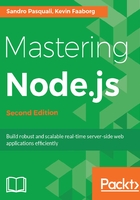
上QQ阅读APP看书,第一时间看更新
Deferred execution
One occasionally needs to defer the execution of a function. Traditional JavaScript uses timers for this purpose, with the well-known setTimeout and setInterval functions. Node introduces another perspective on defers, primarily as means of controlling the order in which a callback executes in relation to I/O events, as well as timer events properly.
As we saw earlier, managing timers is one of the main jobs of Node's event loop. Two types of deferred event sources that give a developer the ability to schedule callback executions to occur either before, or after, the processing of queued I/O events are process.nextTick and setImmediate. Let's look at those now.